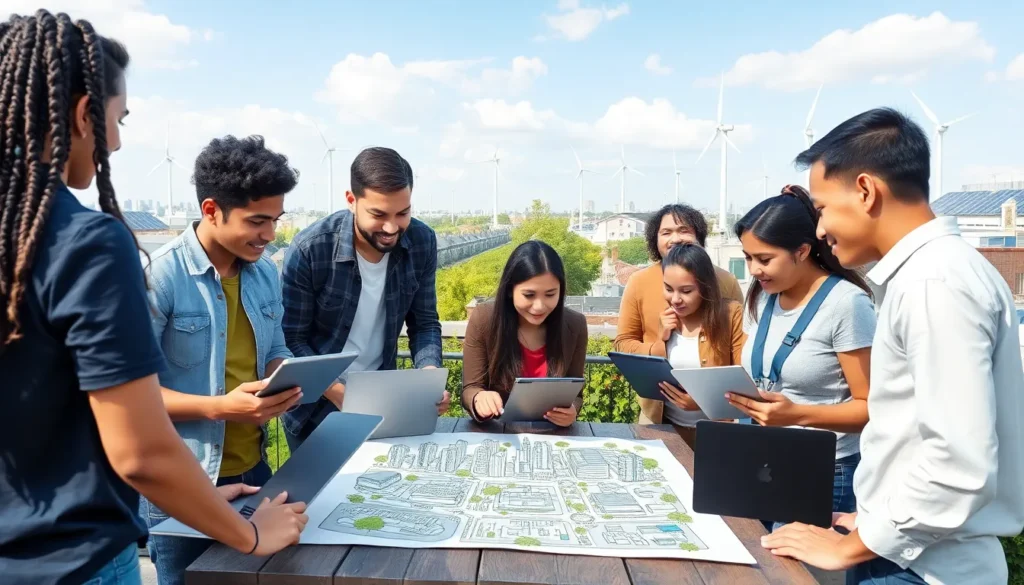Table of Contents
ToggleAs the world spins ever faster into the future, it’s time to embrace the topics that will shape tomorrow. From artificial intelligence to sustainable living, these future-focused ideas aren’t just buzzwords; they’re the keys to unlocking a better world. Imagine a life where technology and nature coexist harmoniously—sounds dreamy, right?
Overview of Future-Focused Topics
Embracing future-focused topics indicates recognizing the trends that significantly influence societies. Artificial intelligence stands as a key area that impacts industries globally. Its capabilities enhance efficiency and drive innovation across sectors, from healthcare to finance.
Sustainable living represents another essential focus, aiming to balance human activity with environmental health. Practices such as reducing waste and using renewable energy sources help mitigate climate change effects. Individuals increasingly adopt sustainable habits, demonstrating a collective movement toward eco-friendly lifestyles.
Technological advancements continue to reshape communication and interaction. Emerging tools and platforms enable more connected and insightful ways to engage with information and each other. The role of big data and analytics can lead to smarter decision-making across various fields.
Education also plays a pivotal role in preparing future leaders for emerging challenges. Integrating future-focused curricula equips students with critical thinking and problem-solving skills needed in an evolving work environment. Lifelong learning initiatives support ongoing skill development in response to rapid changes in technology and society.
These topics are interconnected, influencing one another while collectively setting the trajectory for the future. Embracing these concepts fosters a forward-thinking mindset, essential for addressing upcoming challenges and opportunities. Monitoring advancements in these areas enhances a proactive approach to navigating future landscapes.
Emerging Trends in Technology

Emerging trends in technology shape the future, highlighting key innovations and solutions.
Artificial Intelligence Innovations
Artificial intelligence continues to advance, transforming industries through automation and data analysis. Businesses leverage AI for customer service, utilizing chatbots and virtual assistants to enhance user experience. Real-time data processing accelerates decision-making, particularly in finance and supply chain management. Machine learning algorithms evolve, allowing systems to learn from experience and improve functionality. Healthcare also benefits, with AI-powered diagnostic tools aiding in disease detection. Ethical considerations surrounding AI must not be overlooked, as organizations prioritize transparency and fairness in algorithm deployment. Innovations in AI contribute not only to efficiency but also to the development of new business models that adapt to changing market demands.
Renewable Energy Solutions
Renewable energy sources gain prominence as the world shifts towards sustainability. Solar and wind energies offer cleaner alternatives to fossil fuels, reducing greenhouse gas emissions. Advancements in battery technology enhance energy storage solutions, making renewable resources more viable. Governments worldwide invest in infrastructure to support renewable projects, incentivizing businesses and homeowners to adopt greener practices. Solar panels now integrate seamlessly into buildings, maximizing energy efficiency. Electric vehicles thrive as charging stations become more widespread, prompting decreased reliance on traditional fuel sources. These efforts reflect a commitment to fostering a sustainable future, tackling climate change through innovative energy solutions.
Social Implications of Future-Focused Topics
Future-focused topics bring significant social implications that must be understood. These subjects not only shape industries but also influence everyday life on various levels.
Education and Workforce Development
Education adapts to emerging technological needs. Curricula now emphasize skills like critical thinking and adaptability to prepare students for future job markets. Employers seek candidates capable of leveraging new tools and processes. Additionally, partnerships between educational institutions and industries focus on practical training and internships. Lifelong learning becomes essential, ensuring the workforce remains competitive in rapidly changing environments. Upskilling initiatives support career transitions as automation evolves job roles. This concerted effort fortifies the future workforce against disruptions and enhances overall societal resilience.
Global Health Challenges
Global health challenges intensify amid technological and environmental shifts. Emerging diseases require real-time data analysis for effective response strategies. Innovations in telemedicine make healthcare more accessible, particularly in remote locations. AI-driven diagnostic tools enhance early detection and treatment options, improving patient outcomes significantly. Collaboration among nations becomes essential to address pandemics and health crises effectively. Investing in healthcare infrastructure ensures readiness for future challenges. As sustainability and health intertwine, public health initiatives promote healthier lifestyles, reinforcing community well-being. Social support systems evolve to adapt to these complexities, emphasizing the interconnectedness of global health and technological advancements.
Environmental Considerations
Addressing environmental concerns remains vital for fostering a sustainable future. Future-focused topics encompass various strategies aimed at mitigating climate impacts and promoting eco-friendly practices.
Climate Change Mitigation
Climate change poses significant risks, necessitating urgent action. International agreements like the Paris Accord aim to limit global warming to below 2 degrees Celsius. Transitioning to renewable energy sources significantly reduces greenhouse gas emissions. For example, countries investing in solar and wind energy infrastructure achieve lower emissions rates. Carbon capture technologies also emerge as game-changers, capturing emissions from industrial processes for reuse or storage. Effectively, every action towards reducing carbon footprints plays a vital role in promoting global climate stability.
Sustainable Practices
Sustainable practices push for responsible use of resources, benefiting both the planet and future generations. Implementing waste reduction strategies supports recycling efforts, contributing to less landfill reliance. Communities adopting urban gardening and permaculture showcase ways to utilize local resources efficiently. Incorporating energy-efficient technologies in homes and businesses reduces energy consumption and helps lower costs. Businesses prioritizing sustainability, such as adopting circular economy models, effectively extend product lifecycles. Such actions advance a collective commitment to environmental stewardship.
The Role of Policy in Shaping the Future
Policy plays a crucial role in guiding advancements in artificial intelligence and sustainable living. Regulators establish frameworks that encourage innovation while ensuring ethical practices in AI deployment. Governments prioritize transparency and fairness, addressing public concerns about data privacy and algorithm bias.
Environmental policies significantly influence the adoption of renewable energy solutions. By providing incentives for solar and wind energy installations, they aid businesses and homeowners in transitioning to sustainable practices. Stronger regulations on carbon emissions catalyze action against climate change, benefiting both the environment and public health.
International cooperation enhances global efforts to tackle pressing issues like climate change and health crises. Agreements such as the Paris Accord highlight the importance of collective action in reducing greenhouse gas emissions. Countries commit to sharing resources and knowledge, fostering advancements in technologies like carbon capture.
Local initiatives also play an essential role. Community-based policies promote urban gardening and waste reduction, encouraging responsible resource use. These actions not only improve local environments but also strengthen community ties, reinforcing well-being.
Education policy shapes the workforce of the future. Curricula that emphasize critical thinking and adaptability prepare students for emerging challenges. Partnerships between educational institutions and industries create pathways for practical training, aligning academic programs with real-world needs.
Healthcare policies leverage technology to enhance accessibility. Innovations in telemedicine improve patient outcomes, particularly in underserved areas. Policymakers support these developments through funding and legislation, ensuring equitable access to quality healthcare.
Incorporating well-rounded policy approaches fosters a future where technological, environmental, and social progress coexists. Prioritizing collaboration among stakeholders strengthens efforts, positioning society to tackle upcoming challenges effectively.
Embracing future-focused topics is vital for shaping a sustainable and innovative world. As technology and environmental challenges evolve, proactive engagement with concepts like artificial intelligence and sustainable living will drive meaningful change.
Investing in education and fostering collaboration among stakeholders will prepare society for the complexities ahead. By prioritizing ethical practices and sustainable solutions, individuals and organizations can contribute to a future that balances technological advancement with environmental stewardship.
Navigating this landscape requires adaptability and a commitment to lifelong learning, ensuring that everyone is equipped to tackle emerging challenges. The journey toward a brighter future hinges on collective efforts to integrate these essential topics into everyday life.







